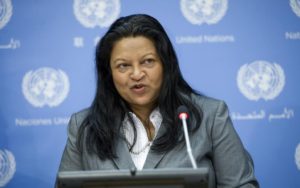- Stay Connected
Eritrea: Referral to the International Criminal Court Urged
Eritrea: Referral to the International Criminal Court Urged
Friday, 28 October 2016, 10:59 pm
Press Release: UNHCHR
Eritrea: UN Commission has urged referral to the International Criminal Court
GENEVA (28 October 2016) – States must heed the pleas of countless victims of crimes against humanity for justice and accountability, Sheila Keetharuth of the former UN Commission of Inquiry on human rights in Eritrea urged the UN General Assembly today. The Commission has recommended that the situation in Eritrea be referred to the International Criminal Court.
Speaking for the Commission of Inquiry, Keetharuth, who is also UN Special Rapporteur on the situation of human rights in Eritrea, highlighted the Commission’s clear findings that crimes against humanity have been committed since 1991 by Eritrean officials, adding that such a dire assessment left no room for “business as usual” in the international community’s engagement with the Government of Eritrea.
“The crimes of enslavement, imprisonment, enforced disappearances, torture, other inhumane acts, persecution, rape and murder have been committed as part of a widespread and systematic campaign against the civilian population. The aim of the campaign has been to maintain control over the population and perpetuate the leadership’s rule in Eritrea,” Keetharuth told the UN General Assembly.
“The Commission has concluded that the Government of Eritrea has neither the political will nor the institutional capacity to prosecute the crimes we have documented. The Commission therefore recommends that the UN Security Council refer the situation in Eritrea to the prosecutor of the International Criminal Court and that the African Union establish an accountability mechanism.”
“My plea to you, Excellencies, on behalf of the three members of the former Commission of Inquiry on Human Rights in Eritrea, Mike Smith, Victor Dankwa and myself, is for you to pay heed to voices of victims of crimes against humanity in Eritrea.”
Keetharuth said the Commission had found that there was no material change in the country that could potentially have a positive effect on the situation of human rights.
“There is still no constitution, no parliament where laws are discussed, enacted, and where questions of national importance are debated; indefinite national service persists, with its adverse impacts on individual rights; there is no free press and no NGOs, except for Government-sponsored ones. The population lives in fear and the Government still controls their daily life, making the enjoyment of all human rights and fundamental freedoms by all Eritreans a remote possibility,” she said.
She noted that while several foreign delegations, journalists and others had been invited to visit Eritrea over the past year, the rampant human rights violations taking place in isolated locations and detention facilities were not apparent to the casual visitor.
Keetharuth noted that Eritreans were among the largest numbers of African nationals seeking asylum in Europe and that the overall recognition rate for Eritrean asylum seekers in European countries remained high.
“The findings of the Commission underscore that it is not safe to forcibly return those who have left Eritrea. The Commission, in its first report, documented that individuals forcibly repatriated, with a few exceptions, have been arrested, detained and subjected to ill-treatment and torture,” she said.
“I appeal to Member States to grant Eritreans access to their territory and asylum procedures. I strongly reiterate my call to protect all Eritrean asylum-seekers from refoulement and to refrain from any forced repatriation to Eritrea or to third countries where they may still be at risk or unwelcomed.”

